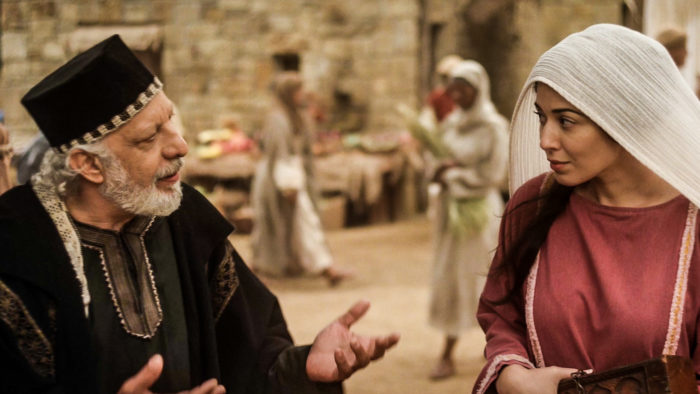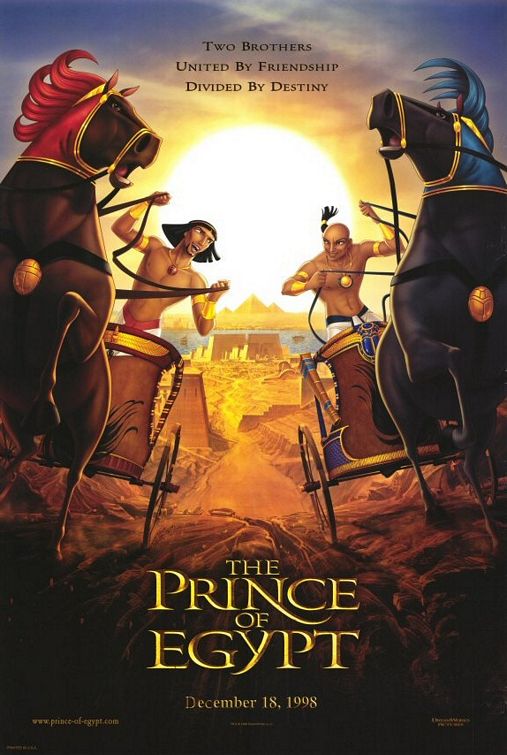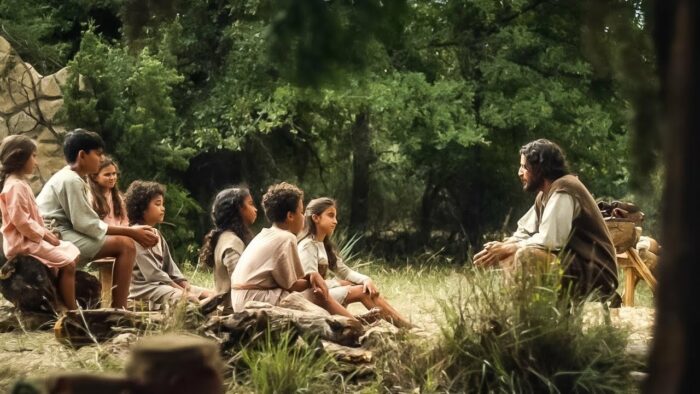Let’s Train Our Kids, and Each Other, to Enjoy and Discern Biblical Fiction for God’s Glory
Before we wrap this Discerning Biblical Fiction series, we must ask: what about the kids? Or what about the grown-ups, such as nonbelievers, or backslidden Aunt Brenda, or brand-new Christians, or anyone else who might not understand how biblical fiction is different from biblical history?
Discerning Biblical Fiction series
- Behold the Fantastic Purposes of ‘The Chosen’ and Other Great Biblical Fiction, May 3
- Biblical Fiction Isn’t Inspired by God, But It Can Inspire Our Imaginations, May 10
- How Great Biblical Fiction Adds Extra-Biblical Images Yet Honors God’s Word, May 17
- Sometimes Unbelievers Help Make Fantastic Biblical Fiction, So Let’s Thank God for Them, May 24
- Let’s Train Our Kids, and Each Other, to Enjoy and Discern Biblical Fiction for God’s Glory, May 31
12. What if kids or others confuse biblical fiction with reality?
So: what about children and other impressionable people who might see or read a work of biblical fiction, and assume that the fictional parts are actually real?
Some kids (and grown-ups!) really do get these things confused.
Lest we dismiss the problem, it really does happen. Christians grow up at different paces. That truth, plus the truth that God gives people different gifts, means that we’re all still growing our imaginations. Kids especially need time to grow in this way. Their brains are even physically changing in response to the way they are raised. It’s hard for them to discern differences between fiction and reality. But as we’ve seen in ourselves and others, that’s not just true of kids!
Still, that doesn’t mean all children are at risk of confusing fiction and reality.
It’s a generalization to say that “all children may confuse fantasy and reality.” In real life, that would depend on the child. Some children grow up faster and in different ways than others. God has made us individuals, not just categories of people.
For example, some children may be “advanced readers,” who prefer skipping past grade-school chapter books and going straight for young-adult adventure novels. Others at younger ages can watch intense movies, such as PG-13 superhero films, without wanting to imitate violence or without believing superheroes are real.
Back to biblical fiction: we shouldn’t assume that all or even most kids are incapable of understanding differences between biblical facts and creative stories! Because kids are still growing up, and often grow very fast, they can often surprise their parents and other grown-ups. They can pick up on ideas in stories. They can start to discern characters’ actions according to God’s word—especially if they are being raised by Christian parents and getting gracious, truthful teaching from grown-ups.

No, Scripture doesn’t say Nicodemus met (or tried to save) Mary Magdalene. But if kids or grown-ups get confused, let’s take the opportunity to teach them basic discernment—not blame the story.
Even kids who do make these confusions need help to grow out of this stage.
What then of children who watch biblical fiction movies, or read books, and do think that Tamar from The Chosen or Judah Ben-Hur are just as real as Noah or Moses?
In that case, it would frankly be rather strange for Christian grown-ups to react as if the children are going off by themselves to watch these shows. Do adults who are concerned about this know that they are responsible for training their children? Or do we assume that TV shows or movies ought to be “safe” for children to watch just as a distraction, while the adults are in another rooms doing something else?
Do we are adults assume that kids should figure out godly discernment on their own? But how can children simply “jump” from parental protection to independent discernment, without receiving in-between time to learn and practice this task?
Rather, if Christian grown-ups say they’re concerned about children not knowing discernment, we must assume that it’s our job to teach them. It’s not the Sunday school teacher’s job, the TV show’s job, or the Christian filmmaker’s job. It’s our job. That means it’s first our job to practice discernment and biblical imagination for ourselves. This way, we can be better equipped to help our children and others!
When we respond to biblical fiction (and any other kind of story!), let’s not skip over our own calling from God in order to talk only about a story’s risks “to the children.” This response can start with good intent. But this response can also become a plain distraction away from God’s calling for us, as mature grown-ups, to be discerning and to practice godly imagination.1
Many children can testify that biblical fiction does draw them to God’s truth.
As we close, I wish to speak about my own influences by biblical fiction. From memory, I can list many biblical fiction shows and other stories I’ve enjoyed. Sure, at times I probably confused extra-biblical ideas with biblical reality. But overall God has used these stories not to make me compromise with Scripture, but to awaken my heart to the fantastic delights of God’s word—and to the power of his gift of imagination to draw our hearts and minds toward himself, his gospel, and his truth.
-

Some 1980s kids have “He-Man.” I have “Superbook.”
When I was a young child, my parents provided me with videotapes of a Christian-made anime series called Superbook. This series featured two children and a robot traveling back in time to biblical settings and stories. I don’t recall ever believing that Chris, Joy, or Gizmo were actually as real as the first Christians, Jesus, or Gehazi! Any changes the stories made to the biblical account usually stuck out to me, because I was already familiar with Scripture’s record.
- Another similar anime series, The Flying House, featured three children, another robot, and a quirky professor whose house not only flies but time-travels to the first century A.D., and then gets stuck. Many episodes of this series changed even more from the Bible. They over-spiritualized Jesus and adding moralistic backstories for the people he healed. As a snarky kid, these changes didn’t confuse me. Instead, they began to annoy me. Still, I loved the series, and I still see how God used it to help me combine biblical truth and fantastic imagination.
- A Christian audio drama, Focus on the Family’s Adventures in Odyssey, often shared biblical fiction. Kids could enter Whittaker’s amazing sort-of-time-travel device, the Imagination Station, and travel into the Bible. As I grew older, I saw how this series reinforced the wonders of biblical truth meeting fantastic imagination. Odyssey’s writers condensed a few details and timescales within the biblical narratives, but emphasized faithfulness to Scripture and to Christ.
-

The Prince of Egypt (1998), Dreamworks’ retelling of the biblical Exodus, changed some details of Moses’s story yet still presented God in all his infinite majesty.
As I grew older, my family discovered more biblical fiction movies. One of my favorites remains The Prince of Egypt in 1998. As I’ve mentioned, this animated epic changed details about Moses’s story. But the filmmakers also exalted the supernatural wonder of God without onscreen apology. Gorgeous animation and a sterling musical score helped show the glory of God redeeming his people.2
To enjoy stories like biblical fiction, we must become like children ourselves!
Let’s recall this humbling observation based on Jesus himself: Often in Scripture, Jesus is not as worried about children’s immaturity or confusion as we might be. Instead, Jesus says things like, “Let the little children come to me and do not hinder them, for to such belongs the kingdom of heaven” (Matthew 19:14). He even says, “I thank you, Father, Lord of heaven and earth, that you have hidden these things [about God’s judgment on sinful people] from the wise and understanding and revealed them to little children” (Matthew 11:25, cf. Luke 10:21).
Years later, the apostle John follows Jesus’s lead, and graciously addresses God’s people by calling them “little children” seven times in his epistle (1 John).
This doesn’t mean that we must follow the old “romantic” ideal of childhood, as if children have some spiritual privilege and don’t need to grow in maturity! Rather, Jesus and his apostles are pointing to the helplessness and humility of a child.
At their best, thanks to God’s grace, children are eager to listen and eager to grow.
If you tell a child a great story, they’re also eager to listen and to practice using their God-given imaginations. It’s a rare child who would instead try to figure out, say, how to use the story as a “practical tool” to earn money or educate other people.
We as grown-ups must be humble like children and receive a story. We can delight in the happy feelings and other intense emotions that stories bring us. We can take joy in the ways these unreal images, people, and places tug at our hearts. We can shut our eyes and imagine ourselves in the ancient worlds of biblical fiction, acting alongside biblical heroes, or fictional characters who also live with biblical heroes.
We can receive stories as children and also act like adults who practice discernment (see Hebrews 5:12–13) to discern between human imagination and biblical history.
To enjoy stories like biblical fiction, we must explore them as the Church!
Let’s conclude with this: If we need help, that’s why God gave us one another in the Church. Some of us are more “logical” than others, like the “heads” in the body. Others of us are more emotional than others like the “hearts” in the body. But if we believe in Jesus, then we are all in the same body of Christ (see 1 Corinthians 12).
This is why we need to be discerning and enjoying biblical fiction (and any kind of story) not as isolated individuals, but together as Christ’s body, the Church.
When we have biblical community like this, we can build deep relationships with each other. We can get to know one another’s strengths and weaknesses. If we need help because we’re weak in one area, we can ask for help. And if we are biblically strong in another area of life, we can offer this help.
Even at long distances, we can help one another with biblical resources, especially in the internet age with articles, podcasts, and social media.
That’s why I hope this series has been helpful to you as a great start. But it’s not the finish. From here, if you find yourself drawn to biblical fiction, your quest is only beginning. Keep studying the Bible. Keep practicing grace according to the gospel and chasing holiness to be like Jesus. Join with a community of believers who are trying to run a church according to the Bible. Share your love for these stories with other Christians you find! Above all, keep growing in your faith and practice growing your imagination for your ultimate purpose: to glorify God and enjoy him forever.
- For more on this crucial topic, consider my nonfiction book coauthored with Ted Turnau and Dr. Jared Moore, The Pop Culture Parent: Helping Kids Engage Their World for Christ. ↩
- For more personal memories of these stories I grew up enjoying, listen to the Fantastical Truth podcast, episode 6: “How Did You First Discover Fantastical Stories?”, March 3, 2020, Fantastical Truth at Lorehaven.com. ↩





























Share your fantastical thoughts.